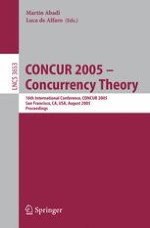2005 | OriginalPaper | Buchkapitel
Games Other People Play
verfasst von : Christos H. Papadimitriou
Erschienen in: CONCUR 2005 – Concurrency Theory
Verlag: Springer Berlin Heidelberg
Aktivieren Sie unsere intelligente Suche, um passende Fachinhalte oder Patente zu finden.
Wählen Sie Textabschnitte aus um mit Künstlicher Intelligenz passenden Patente zu finden. powered by
Markieren Sie Textabschnitte, um KI-gestützt weitere passende Inhalte zu finden. powered by
Games were used by Wittgenstein as an example in the philosophy of language of a concept that can have many and dramatically divergent meanings in different contexts.
Case in point: Games are familiar in the Concurrency community as models of dynamic, multi-staged threats to correctness. In Economics, on the other hand, games refer to a family of mathematical models (including, strictly speaking, the games alluded to above) whose intention is to model the behavior of rational, selfish agents in the face of situations that are to varying degrees competitive and cooperative. In recent years there has been an increasingly active interface, motivated by the advent of the Internet, between the theory of games on the one hand, and the theory of algorithms and complexity on the other, and both with networking. This corpus of research problems and reults is already quite extensive, rich, and diverse; however, one can identify in it at least three salient themes: First, there is the endeavor of developing efficient algorithms for the fundamental computational problems associated with games, such as finding Nash and other equilibria; this quest is more than the predictable reflex of our research community, but it is arguably of fundamental value to Game Theory at large. There is also the field of algorithmic mechanism design, striving to devise computationally efficient methods for designing games whose equilibria are precisely the socially desirable outcomes (for example, that the person who has the highest personal appreciation for the item being auctioned actually wins the auction). And finally we have an ever-expanding family of problems collectively given the playful name “the price of anarchy,” studying how much worse a system emerging from the spontaneous interaction of a group of selfish agents can be when compared with the ideal optimum design.
This talk will review recent results and open problems in these areas.
